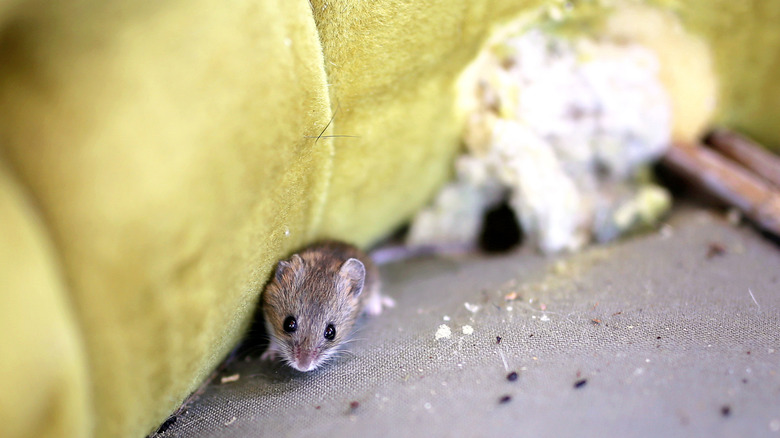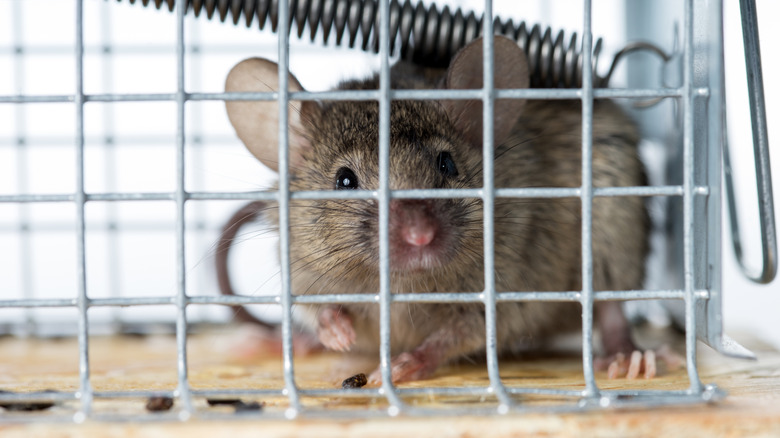Why Candles And Soap Could Bring An Unexpected Pest To Your Home
According to an annual Orkin survey, New York City doesn't have the highest rat population. Instead, Chicago has the most, and Los Angeles has the second-most. Even if you don't live in one of these cities, rodents and vermin can be attracted to your home. What you might not expect is that mice are attracted to everyday household items like candles and soap.
You may have heard or seen online that mice are deterred by strong smells, such as those from candles and soaps, including shampoos. However, there isn't enough scientific evidence to support that. Instead, the opposite may be true depending on the scent, particularly if it smells like food. Mice like to build their nests near their food sources — which isn't surprising since they eat 15 to 20 times a day — so they may end up making your nice smelling home their home.
If you do have food-scented candles or soaps, these small rodents could follow that scent into your home. Mice have even been known to eat them because these products are often made with fats and oils, and the animals prefer to eat foods that are high in fat. These are scarce sources of energy in the wild, so mice have adapted to take advantage of them when they can find them. While using candles and soaps doesn't guarantee that mice will infiltrate your home, you could have a problem if you don't clean up residues or spills.
How to tell if you have mice
Mice are important animals in their ecosystems, playing a part in forest and grassland survival by controlling some insect populations, digging tunnels that aerate the soil, and spreading fungus and seeds. They are also prey for larger animals such as bobcats, foxes, and hawks. Since they are known to carry diseases that can spread to humans, such as hantavirus, you don't want them to overstay their welcome in your home. That's why it's essential to know how to spot the presence of mice.
Aside from actually seeing the mice, you can identify rodents by their droppings, which look like small, round or rod-shaped pellets about 3 to 6 millimeters long. Hair is often embedded in the waste, too, because the animals sometimes swallow their fur while cleaning themselves. The droppings may be under sinks, in cabinets and drawers, and near food packages. There could even be chew marks on food packages, as well as through floors and walls where they created their own entryway into your space.
Another sign of a mouse infestation include four-toed front and five-toed back footprints on surfaces like counters. And, since mice are nocturnal animals, you're likely to hear gnawing, scratching, and even squeaking in your walls or scurrying on the ceiling when it gets quiet and dark. Because these rodents use urine to communicate with each other, you might notice an odor, too.
How to get rid of and prevent a mouse infestation
While peppermint is known to repel mice, using only peppermint-scented candles and soaps isn't the most reliable way to get rid of mice and prevent them from making your home their home. That's because DIY solutions like these don't address the root cause. Without fixing the problem, the mice are likely to return.
First, you need to identify where the animals are nesting so that you can set mouse traps nearby. You can get snap and electric traps that stop the rodents in their tracks or even humane cages that simply catch them. Peanut butter, which is also used to make food for squirrels (another type of rodent), is one of the best baits to use in the traps because of its high fat content, but bacon, bird seed, chocolate, and nuts work as well. Meanwhile, clean up around your property to ensure that there's nothing else that will attract mice. Once you've gotten rid of the rodents, you can fix the root problem.
Start with filling in the holes where the mice entered, whether the holes were already there or the mice created them. These small animals can fit under exterior doorways, so install door sweeps to prevent them from crawling under. Also, repair any other cracks and holes that lead inside, such as around pipes and other utilities. Always clean up residues or debris from candles, soaps, or any other fat-, protein-, and sugar-containing products that may attract mice. Then, maintain these repairs and cleaning practices to prevent a mouse infestation in the future.


